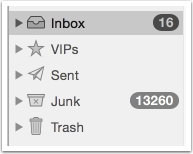Spammers, eh?
 I’m back from a fun and successful trip to the APSIS Email Marketing Evolved conference. Of course, this means I’m digging out my mailboxes and going through mail I’ve ignored for the past week. It’s amazing how the spam builds up when I’m not tending to it every day.
I’m back from a fun and successful trip to the APSIS Email Marketing Evolved conference. Of course, this means I’m digging out my mailboxes and going through mail I’ve ignored for the past week. It’s amazing how the spam builds up when I’m not tending to it every day.
One of the new spam streams is coming into the role account we published with our recent job posting. These are relevant newsletters in that they are designed for employers and are advertising services to help us find candidates. My favorite is probably the one that has this footer.
This email message is confidential, intended only for the named recipient(s) above, and may contain information that is privileged, attorney work product, or exempt from disclosure under applicable law. If you have received this message in error, or are not the named recipient(s), please immediately notify the sender at contact@employmentcrossing.com and delete this email message from your computer. Thank you.
Office: 20 S Altadena Dr, Pasadena, CA 91107
You are receiving this email from us because you signed up with us and/or our group career companies from careers@
If you no longer wish to receive this mail in future : Unsubscribe Here
The named recipient is the oh-so-specific “Employer.” Yeah, no. I would say this message was received in error, as the sender has erred by spamming me.
I also found a message from a website called brewster.com. They sent me a message with the subject line “Laura Atkins’s popularity score is in top 1%.” When I open the message, they inform me:
Your popularity rank is based on who has you as a contact. See how you compare to Sam Melamed and others.
Click below to check out your rank and see the 2 emails and 2 phone numbers people have for you.
I am, apparently, more popular than some Google Groups, who are also receiving notices that they are popular on Brewster.
Apparently this is some sort of PII collecting machine that harvests data out of their users’ address books and then collects it. I did some poking over on their website and they promise to maintain the privacy of their actual users, but make no mention of privacy for non-users. Their twitter feed is full of requests to send mail to support@brewster.com in order to “resolve” the issues.
On a marketing level both of these may be reasonable tactics to collect data and find targets. I’m sure, in fact, these companies would both tell me they’re legitimate marketers and are doing nothing wrong. But both companies are spamming, full stop. They’re scraping addresses from various sources and sending large amounts of mail. One of them is sending from a private VPS hosting company. The other has lost at least one ESP due to their poor sending practices.
These are only two of the examples of legitimate spam I received over the last week. Sure, there was a lot of russian porn spam, too. But there was a depressing amount of spam from real sources. At least with the responsible ESPs I know the issue will be appropriately dealt with.